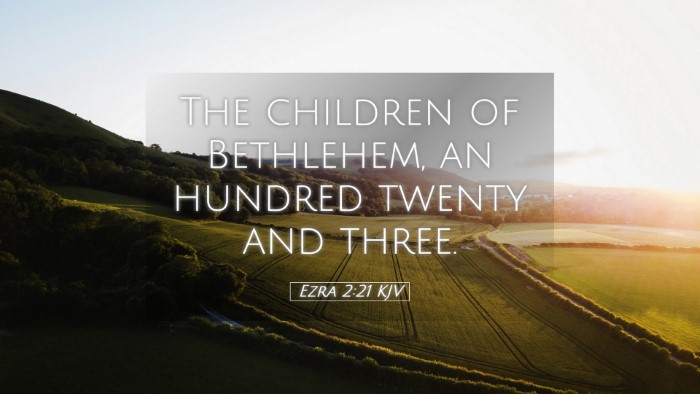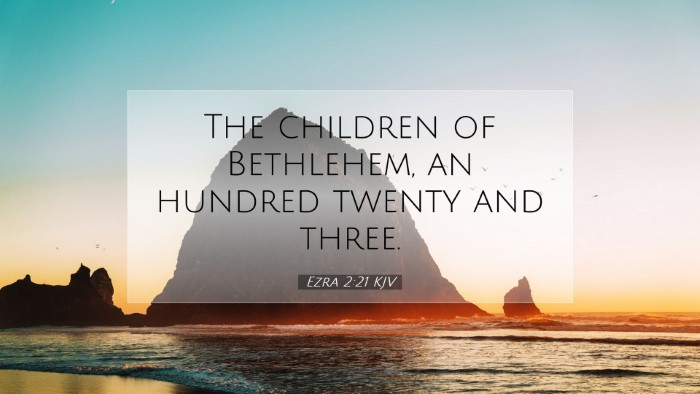Commentary on Ezra 2:21
Verse Context: Ezra 2:21 states, "The children of Bethlehem, one hundred twenty and three." This verse is part of a larger list that accounts for the exiles returning from Babylon to Jerusalem, and it signifies the importance of each group that contributed to the restoration of Israel.
Introduction
This passage, while seemingly a mere statistic, holds deep significance for understanding the foundational community of God's people as they return from exile. The insights derived from public domain commentaries will help elucidate the importance of these returning families, particularly the children of Bethlehem.
Commentary Insights
Historical Significance
Matthew Henry emphasizes that the numbering of families and their descendants demonstrates the faithfulness of God in preserving His people. Each name and group serves to remind us of God's promise to Abraham, Isaac, and Jacob, showing that even during captivity, the lineage remained secure.
Albert Barnes notes that Bethlehem had a special prophetic significance as it was the birthplace of David. The return of families from Bethlehem indicates a restoration of leadership and a recognition of the Davidic lineage which would later culminate in the birth of Christ. It reflects God’s ongoing plan of redemption through His chosen lines.
Adam Clarke points out that the mention of 123 individuals indicates the modesty of Bethlehem’s return. This number may reflect the socio-political realities of the time — a diminished community yet one with a significant heritage. It prompts reflection on how God's truth and promises persist, even among small numbers.
Theological Reflections
Ezra 2:21 serves as a reminder of God's covenant relationship with His people. The return of those specifically from Bethlehem illustrates that God's plans are often a restoration of the past glory, entwining history with present hope. It indicates that while numbers may seem small, the significance of those individuals can have profound impacts.
- Covenantal Faithfulness: The line from which these returnees are drawn emphasizes God’s faithfulness to His covenant despite the trials of exile. Each number has a backstory that highlights individual faithfulness and God’s providence.
- Redemption through Small Beginnings: This portion of scripture invites reflection on how significant works of God often start in small ways. The remnant returning is a foreshadowing of the remnant that Christ gathers into His kingdom.
- The Role of Remnants: Throughout biblical history, God has worked through small groups to achieve His purposes, illustrating that a faithful remnant can effect great change, as seen with the disciples in the New Testament.
Lessons for Today
The census of those returning from Babylonian exile reveals important lessons relevant to contemporary readers. Just as these individuals were integral to the reconstruction of Jerusalem, today’s believers are called to be active participants in God’s restorative work in the world.
- Community and Identity: The enumeration of the children of Bethlehem serves as a reminder of the importance of community and identity in the life of faith. Each believer, regardless of stature, is valuable to God’s purposes.
- Encouragement in Numbers: For pastors and church leaders, this passage provides encouragement. Even when a congregation or group seems small, significant impact can stem from unified, faithful action.
- The Importance of Heritage: Understanding our spiritual heritage and the faith of those who came before us must motivate believers to continue the legacy of faith and obedience.
Conclusion
Ezra 2:21 may superficially appear as a list of numbers, yet it is profoundly significant in illustrating God's faithfulness, the heritage of believers, and the impact of the faithful remnant. The insights drawn from historical and theological perspectives remind us that every individual contributes to God's overall plan for redemption and community restoration. Pastors, students, and theologians alike should reflect on how God uses even the smallest numbers for His glorious purposes.


